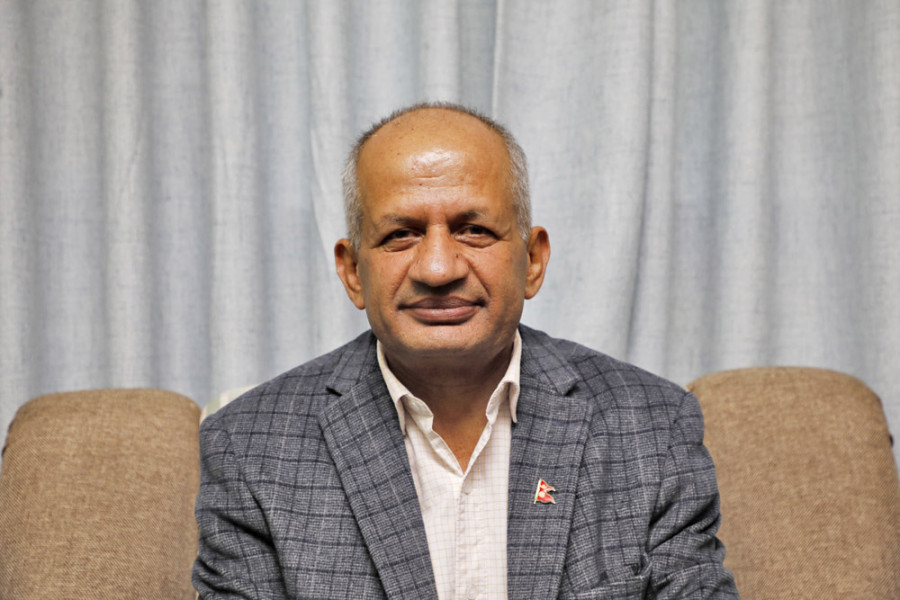National
Gyawali returning home after three-day Delhi visit; no talks with Modi
There were expectations that the foreign minister would be meeting with the Indian prime minister, but it could not materialise.
Suresh Raj Neupane
Foreign Minister Pradeep Gyawali is returning to Kathmandu after completing his three-day visit to India. Though it was expected that he would be meeting Indian Prime Minister Narendra Modi, it could not materialise.
According to sources, the Nepali side had tried to seek time with Modi for a meeting.
On the last day of his visit, Gyawali on Saturday morning held a meeting with India’s Defence Minister Rajnath Singh.
The Nepali side was expecting a meeting with Modi even until Saturday before Gyawali’s scheduled flight at 2pm.
The Nepali embassy in New Delhi too had been trying to fix up a meeting between Gyawali and Modi long before Gyawali landed in India.
Nepal’s Ambassador to India Nilamber Acharya refused to comment.
Gyawali visited India also on the heels of Prime Minister KP Sharma’s House dissolution move, which has created political uncertainty in Nepal. Oli has called snap polls for April 3o and May 10. But since the House dissolution decision has been challenged in the court, there is uncertainty if elections will happen.
As Gyawali was embarking on the visit, there were expectations that he would meet with the Indian leadership and apprise them of the developing political situation in Nepal and try to justify Oli’s House dissolution move.
On Friday, addressing a function in Delhi, Gyawali said that the House was dissolved so as to seek a fresh mandate to “make the people of Nepal sovereign.”
Diplomatic sources told the Post that Gyawali’s meeting with Modi could not materialise because of the latter’s busy schedule on Saturday.
Modi on Saturday launched India’s Covid-19 vaccination drive, the world’s largest inoculation exercise against the coronavirus.
Political situation in Nepal has also been viewed as one of the reasons why there was no meeting between Gyawali and Modi.
Oli’s move of dissolving the House has divided the political spectrum in Nepal, according to sources.
Political parties in Nepal have been protesting against Oli’s House dissolution move, calling it unconstitutional.
[Modi] Meeting with the foreign minister of a caretaker government when the political situation is fluid in Nepal could have sent a wrong message in Nepal, according to analysts.
New Delhi appears to show it is taking a hands-off approach, giving a message that it is staying away from Nepal’s internal political affairs.
Gyawali arrived in Delhi on Thursday to participate in the Sixth Meeting of the Nepal-India Joint Commission, the highest level mechanism that deals with the entire gamut of bilateral relations between the two countries.
On Friday, Gyawali and his Indian counterpart S Jaishaker co-chaired the Sixth Meeting of Joint Commission, where Nepal-India relations, cooperation on Covid-19 vaccine and other issues like trade, commerce, connectivity, status of India-funded projects in Nepal among others were discussed.
Despite the Nepali side raising the boundary row, the Indian side showed reluctance to get into the matter, saying the issue should be left for the foreign secretary level mechanism and the Boundary Working Group to deal with.
Nepal-India ties, which started to sour in November 2019 after Delhi published a new political map of India placing Kalpani within Indian borders, hit a rock bottom in May last year.
In the first week of May, Singh virtually inaugurated a road link via Lipulekh to Kailash Mansarovar in the Tibet Autonomous Region of China, sparking furore in Nepal. In response, Kathmandu got a new Nepal map endorsed from the Parliament, depicting Kalapani, Lipulekh and Limpiyadhura as Nepali territories.
Delhi objected to the move, calling Nepal’s action cartographic assertions.
Nepal, however, has maintained that the territories belong to Nepal and the KP Sharma Oli government made claims that it would bring the land back.
During his address to the upper house last week, Oli said that Gyawali was travelling to New Delhi and would take up the boundary issue with India.
However, as soon as Gyawali landed in Delhi on Thursday, India hinted boundary talks were unlikely.
“Our position on the boundary issue is well known,” Anurag Srivastava, spokesperson for India’s Ministry of External Affairs, said during a regular press briefing on Thursday. “The joint commission and boundary talks are two different mechanisms.”
Gyawali’s is the first visit to India at the highest level from Kathmandu in over a year. His trip to Delhi follows a flurry of visits from India in October and November, when the southern neighbour sent its foreing spy chief, the army chief and foreign secretary, in signs of rapprochement.
No details were immediately available on the meeting between Gyawali and Singh, except the latter taking to Twitter to hail Nepal-India ties.
“Had a wonderful meeting with the Foreign Minister of Nepal, today,” Singh wrote on Twitter after the meeting. “India’s relations with Nepal are not limited to governments in both the countries but it is driven by the people of both the nations. India-Nepal relations offer limitless potential.”
Ambassador Acharya said during the 45-minute-long meeting, the ministers had a cordial discussion on various aspects of Nepal-India bilateral ties.
“The two ministers talked about the cultural and historical closeness the two countries share,” said Acharya. “No discussion was held on Nepal’s internal political affairs.”




 16.47°C Kathmandu
16.47°C Kathmandu














